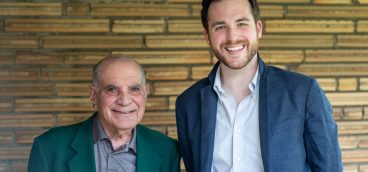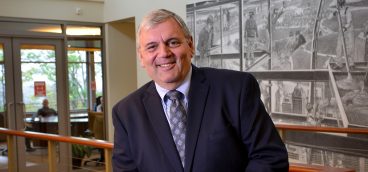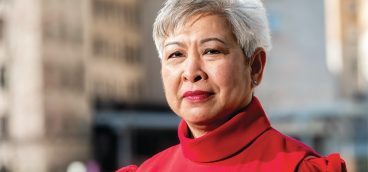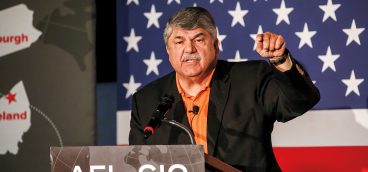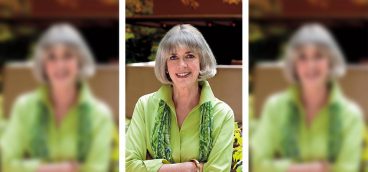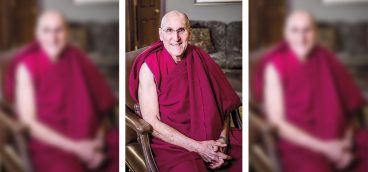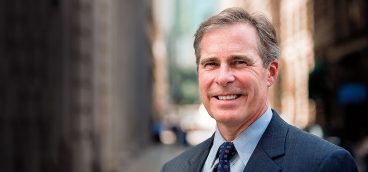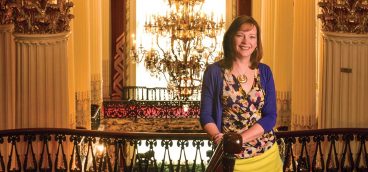Seven Questions for George Greer

Editor’s Note: On Saturday, July 26th, George Greer passed away at the age of 92. A native of Sharon, Pa., he became a longtime mainly behind-the-scenes leader in Pittsburgh and successful advocate for broad community progress, leading the Eden Hall Foundation. On the occasion of his passing, I thought you would enjoy reading a recent interview I did with George. — Doug Heuck
Five years ago, the Pittsburgh Cultural Trust named its Cabaret at Theater Square after philanthropic leader George C. Greer. The longtime executive of the H.J. Heinz Company has been perhaps the least known most effective civic leader in Pittsburgh over the past 30 years, eschewing the limelight as he led transformation of the Eden Hall Foundation from a sleepy North Hills-based philanthropy to one of the region’s most catalytic forces. After 30 years chairing Eden Hall’s board, Greer retired this year and Pittsburgh Quarterly asked him to trace his and Eden Hall’s paths and consider what the sees for Pittsburgh’s future.
Q Where did you grow up, and how did you find your way to Pittsburgh?
A. I was born in Sharon, Pennsylvania, and I had a wonderful growing-up there. Sharon was a very busy town in those days, with a very busy industrial center. It had a wonderful high school. In 1950, I went off to Penn State for four years and then to law school at the University of Pennsylvania. There was a draft, but when I was in college, I was deferred. But when I graduated from Penn in 1957, the draft man was sitting on the doorstep.
It was a six-year stint — two years active duty, two years active reserve, and two years of inactive duty but going to meetings. I moved to Fort Jackson, South Carolina, and then off to Fort Benning, where I was inducted into the 3rd Infantry Division. I loved the infantry and the service at Fort Benning. Then our division went to Schweinfurt, Germany, in Bavaria, for two years. I was one of three lawyers in my battle group and it was very interesting service and a great break from 18 years of school. Frankly, I think every kid in the U.S. should have some sort of regimented service, where we all get our hair cut and look alike, and create a society where we treat each other better than we do now.
After I was discharged from the service in New York City, I visited friends in Philadelphia, which is where I thought I’d like to stay. I loved Philadelphia. Then I stopped in Pittsburgh and had lunch with a former roommate at Penn, who was clerking for a judge at the federal court. He said the Heinz company was looking for lawyers. In the back of my mind, I wanted to do something that gave me the opportunity for international travel. Heinz hit the spot. My interview was in that beautiful lobby of the company’s headquarters, and one of the first questions was, “Where do you go to church?” The Heinz family were Presbyterians. I said, “Episcopalian.” And the answer was, “That will probably serve.” That afternoon, as I was driving back to Sharon, I was lighting a cigarette, which I did now and then, and my Renault dipped off the road and flipped over a few times. I had a broken clavicle and got emergency treatment. It was very painful. But I got a call from Heinz, and they said, “If you want to work, we’re ready for you.” I started at $450 a month.
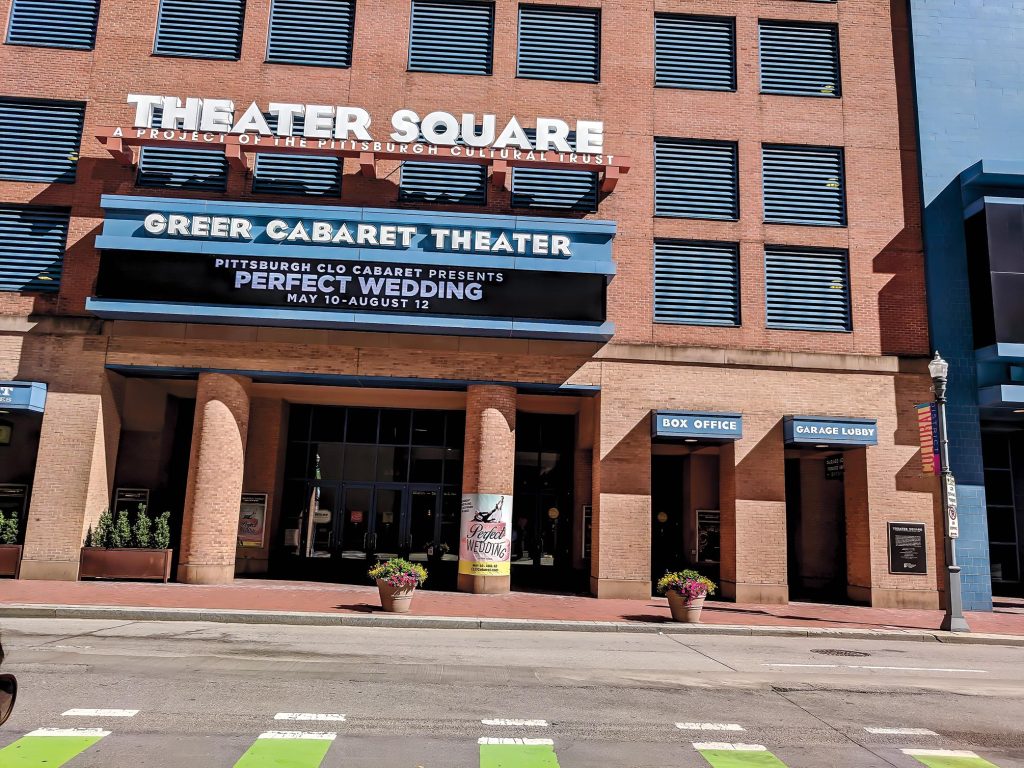
In 2003, The Pittsburgh Cultural Trust opened Theater Square and with it, the signature Cabaret Theater quickly became the heart of the City’s Cultural District. The project was aided by a $5 million grant from the Eden Hall Foundation. The Cabaret Theater continues to be home to fantastic musical productions, late-night entertainment, live music, and outstanding food.
Q Many have noted that your varied career at Heinz prepared you for philanthropic work. What did you do at Heinz?
A. I was having a wonderful time at Heinz. I was happy, single, and putting money away. The three lawyers in our legal department did everything. Within a couple of months, Frank Armour, the president of the company, asked me to come to an Executive Committee meeting and to opine about things I knew nothing about. I had been pretty good at winging things, and I did a lot of winging. It was wonderful for a young guy. I was not a great legal scholar, but this was ideal for me to get into all kinds of things, and I got a chance to work with really great lawyers we’d hire from the outside to do specialty work. Ralph Demmler, who had been chairman of the Securities & Exchange Commission and a longtime Reed Smith lawyer, was a mentor to me. If I had a question, he’d say, “Well George, let’s look at the statute.” And he would pull out the law book and we’d start at the beginning and work through it.
I loved languages — Spanish, French and Russian — and one day I got a call from Burt Gookin, the CEO, who said, “Come on up here. We’re going to buy some companies in Mexico and we need someone to go down and work with the Mexican lawyers representing us.” I rode along in first-class with Burt and spent a week, and then six weeks, working on the acquisition of half a dozen companies.
In 1969, a friend at Heinz called me in one day and said, “You know there are lots of opportunities for you. One we’d like you to try is marketing.” This was at Thanksgiving. “We want you to go over to England.” So I went over to London and talked with the managing director, who said, “We think we have a job for you in marketing — you can be a product manager.” I came back to Pittsburgh and said, “What the hell do you do in marketing?” That’s the kind of expertise I brought to the job. My wife Jane and our sons Andy and Steve and I lived in England for a couple years, bought a house and developed wonderful British friends. Then I got notice they wanted me to come back to Pittsburgh. When I told my British friends I was leaving, one who ran a big, successful company said, “Why don’t you stay and become marketing director for me?” It was one of the most difficult decisions of my life. Something said I’d be better off at home, and it wasn’t long before my British friend’s company was sold, so it was the right decision to come back to Pittsburgh.
Q How did your work with Eden Hall begin?
A. At Heinz, they weren’t sure what they were going to do with me. I spent a few months working with the personnel people, developing better relations with marketing, and then I worked in corporate development, working with our senior management groups around the world. It was a job I really loved. During that process, Jack Heinz thought I could be useful in the community, representing Heinz. And that’s where I got started in doing all sorts of community things, including a planning group for the United Way. We would discuss what would make good organizations for United Way to support, and I got to know so many interesting people who were much more advanced in community affairs than I was.
I began to work with the Eden Hall Farm in the North Hills, which was run from the personnel department in Heinz USA. Charles Heinz ran it. The farm had assets way beyond its needs. It had been given by Sebastian Mueller, Henry J. Heinz’s brother-in-law, to help working women have nice times in the country. Heinz women came from all over the world and could spend a week or two there riding horses and playing tennis, all expenses paid, including airfare. But in time, fewer women wanted to do it. So the assets were transferred to what became the Eden Hall Foundation.
I went onto that board, which had five people, with offices in the North Hills. And we generally gave money to North Hills-related groups. I became the chairman of the board. I had a broader vision for it, and we moved the headquarters to the U.S. Steel building. I said, “Let’s make this more meaningful to the broader Western Pennsylvania community.” Originally, we had a small board and everyone was from Heinz. We never had an executive director, and we were kind of guided by, “What would Sebastian Mueller say?”
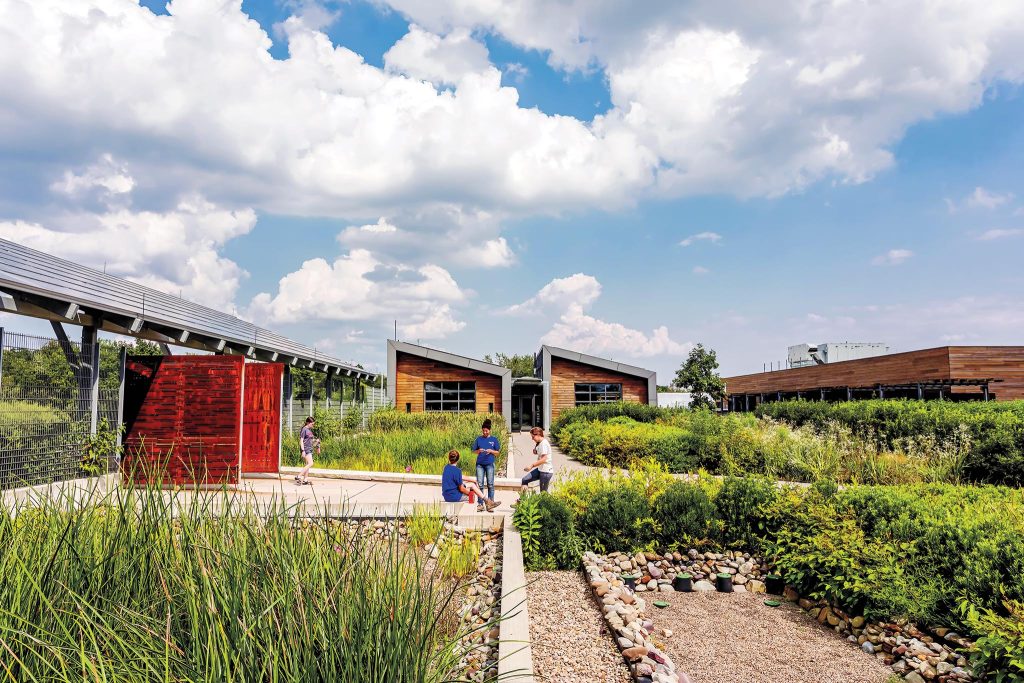
With a grant from the Eden Hall Foundation, what was once Eden Hall Farm became part of the campus of Chatham University with a focus on sustainability.
Q For a local private, family-related foundation, is it fair to say you had unusual freedom in that no family members were around? If that’s true, how did you and your board chart the foundation’s course? And what role, ultimately, did you see the Eden Hall Foundation playing in this region?
A. At some point, the amount of money in the foundation was starting to become much more significant. I wanted Eden Hall to be an independent foundation grounded in principles, cognizant of Sebastian Mueller but also some of the things Jack Heinz was interested in. One was helping the Cultural Trust, which I personally became greatly involved with. The plan for Eden Hall, I will say, was my own vision, and the trustees liked it, and we had wonderful trustees, including John Mazur, who was treasurer of the company.
But I had a pretty free hand. And once we moved to the U.S. Steel building, we became known as a foundation that anybody might come to. And during that time, people would ask me to sit on various boards. Tony O’Reilly, the CEO of Heinz, said he didn’t have time to get involved in local boards, so I got involved in probably 20 boards. Some I enjoyed. Some I didn’t think were great organizations. And if I didn’t, I wouldn’t stay very long. That was kind of the introduction to the good works part of my life.
Q In the late 1990s, you hired Sylvia Fields, who became Eden Hall’s executive director. There were very few women leading foundations then and no black women leading them in Pittsburgh. What was your thinking then — which many say was ahead of its time?
A. In the late 1990s, I hired Sylvia Fields. It’s funny, when Sylvia came in and we talked, I was just impressed with her. She wasn’t ready yet to be an executive director, but there was something going on there. She and I are dear friends now. But at the beginning she was very competent. And we’d sit and talk about why I thought we might go one way, and she’d say why we might go another way. And she had lots of insights into organizations I didn’t know about.
On the race issue, I didn’t set out to hire a black person and I did not set out to hire a woman.
You could tell she could develop into something really good, and she did. She always kids me and says I was her teacher and mentor — and I think I was — but she didn’t always agree with me. She knew her way around the community. She could step into organizations and speak critically about the work they did — even black organizations. She was not one of these people who thinks every black organization is the epitome of good.
I developed a great deal of confidence in her over a couple of years, and we decided Sylvia should run the foundation. She became the executive director and I stepped back. And I didn’t want anyone to have the impression I was running things. That’s very difficult in Pittsburgh, where everyone wants to talk to the chairman. So I’d say, “Sylvia runs the foundation. Go talk with her and see where things go, and if you want to talk later with me, I’ll talk with you.”
Q What’s the most difficult part of leading a philanthropic foundation in Pittsburgh and what’s the best part?
A. The most difficult part about being in philanthropy and running a foundation is there are so many good causes and having to sort out what are we going to give our money to? And how do we say no to this wonderful organization that is doing good work but probably is going nowhere as an organization? Do we tell them to merge? How do we discourage them without discouraging them? The community has huge needs.
The best part is that it’s so satisfying to see organizations attack problems and see them improve the situations. The idea always had been to make Eden Hall a foundation that could have impact and not just put money where everyone else put money.
Q As you’ve watched and played a key role in Pittsburgh’s evolution in the past 30-40 years, what have been the key ingredients in its progress and what has held it back, in your view? What do you think this area needs most to catalyze a resurgence and successful future?
A. What has held back this community is leadership. We don’t have the corporate leadership we used to. I defy most people to tell you who the president of U.S. Steel is today. In the old days, there were so many strong leaders and you could go to them and say, “Could you support this? Could you help with that?” There were offices where you would walk in and people would listen. Where are they now? Some are just totally committed to their businesses. I just don’t know them and that might be a function of me, but it may also be there’s a lack. Where are the people who will rise up and lead?
However, I also have an innate sense that this community will solve its problems, that things will come right. There’s so much that’s good here. I love the place. I just wish there were more leaders who addressed our problems more vigorously. But I’m no great picture of someone who’s done all these things for Pittsburgh. I’ve just worked with money that was handed to me. But I’ve tried to do my part.


